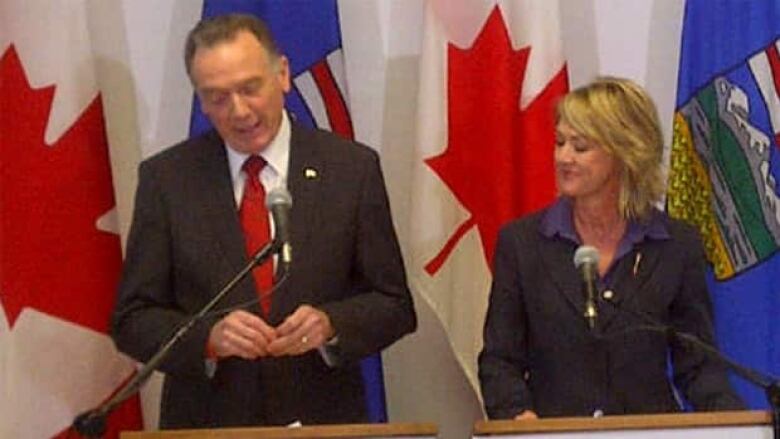Alberta, Canada launch joint oilsands monitoring system

Monthly water testing is part of a new "world class" federal-provincial environmental monitoring plan for the Alberta oilsands announced Friday in Edmonton.
The plan,whichseeks toimprove and increase the monitoring of water, air and habitat in the oilsands, will cost about $50 million a year to implement in its firstthree years, with industry picking up the cost.
Management ofthe new system will be shared by the federal and Alberta governments.
"Improvements are necessary if we want to have world-leading environmental monitoring in the oilsands," said federal Environment Minister Peter Kent, who joined AlbertaEnvironment and Water Minister Diana McQueenat the announcement in Edmonton on Friday.
"We need to match our commitment to environmentally responsible development with a world-class, comprehensive and transparent monitoring program."
Work on the three-year implementation plan starts this spring. Results from the tests will be made public to allow for independent scientific assessment.
P.O.V.
Is the new plan satisfactory?Take our poll.
Annual progress reports will be done in each of the first three years, with a full peer reviewby the end of the implementation period in 2015. Afull reviewwill be conductedevery five years after that.
No independent commission yet
The plan comes after panels appointed separately by the federal and provincial governments concluded last year that the existing monitoring systemswereinadequate.
Last June, the Alberta Environmental Monitoring Panel called for a scientifically rigorous, independent monitoring commission.
Although it wasn't announced Friday, McQueen said, work is proceeding on the commission, an idea she supports. However, she added, the immediate priority is getting the monitoring systems in place.
"To me what was most important as minister is that we get this plan out quickly ... so that we do not lose on this monitoring season," she said.
David Schindler, the world-renowned University of Albertabiologist whose research prompted the creation of the federal and provincial review panels, called the scientific aspect of the plan "terrific."

Buthe is concerned about the immediate lack of independent oversight.
"I think we're unanimousand we're talking here about the scientists and the panel members who've been briefed in saying that is not the right strategy. There's been too much trust lost here to the public," he said.
The lack of an independent commission alsotroubled Linda Duncan, the NDP MP for Edmonton-Strathcona.
"Given the fact this won't be an independent commission, how can we have confidence, given the secrecy in the Harper regime, that we are really going to get, in a quick time frame, access to that raw data?" she asked.
Water monitoring in the oilsands was performed by the Regional Aquatics Monitoring Program (RAMP), whichwasfunded by industry.
In 2010, the program was criticized by Schindler after he published a study with his colleague, Erin Kelly, that linked toxins in the Athabasca River to oilsands mining.
RAMP officials had said that the toxins were caused by natural sources in the land.
But the findings in Schindler's report led him to conclude that the current monitoring system was defective and insufficient, and prompted the federal and Alberta governments to convene expert panels on the issue.












_(720p).jpg)


 OFFICIAL HD MUSIC VIDEO.jpg)
.jpg)



























































































